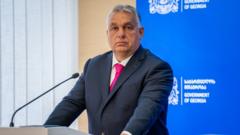Hungarian Prime Minister Viktor Orban publicly endorsed Georgia's ruling party following its recent electoral victory, which has been labeled as contentious amid a backdrop of significant allegations regarding voting irregularities. During his visit to Tbilisi on Tuesday, he characterized the elections as "free and democratic," while conveniently omitting references to numerous claims of malpractice associated with the vote.
The European Union's observer mission expressed concern, asserting that the elections did not fulfill the criteria of fairness as expected by democratic standards. This sentiment was echoed by Georgian President Salome Zourabichvili, who argued that the vote was tampered with and accused external influences of intervening in the electoral process. In a stark contrast, Orban took the opportunity to critique his EU counterparts, suggesting a double standard where liberal victories are hailed as democratic while conservative results draw skepticism.
Criticism of the election's legitimacy isn't confined to a single political group; both US and EU officials have urged for an independent review of the reported violence and intimidation, as well as misconduct during the electoral process. Opposition leaders maintain that their defeat signifies a further shift towards Russian influence in Georgia.
European Commission President Ursula von der Leyen emphasized the necessity for a transparent and independent investigation into the alleged electoral irregularities. Meanwhile, hundreds of thousands of Georgians participated in protests demanding accountability, highlighting the nation's division over the election's outcome.
Despite the mounting evidence presented by the independent monitoring group "My Vote," which documented various forms of electoral fraud, including vote-buying and carousel voting techniques, Georgian officials along with Orban dismissed these claims. Furthermore, Georgia's Prime Minister Irakli Kobakhidze posited that the elections adhered to legal standards, vehemently denying accusations of being pro-Russian or endorsing authoritarianism.
The electoral commission has defended the vote’s integrity, dismissing the allegations and asserting that the systems in place made it impossible for manipulation to occur. Yet, skepticism remains, with critics accusing the commission of being under governmental control, thereby questioning its impartiality. Independent observers like Eka Gigauri of Transparency International have expressed doubts about any genuine investigation being conducted, pointing to a broader narrative of a compromised electoral environment and systemic disillusionment with political authority in Georgia.



















